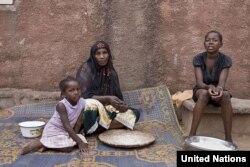GENEVA —
The United Nations refugee agency (UNHCR) reports food shortages are growing in Mali as more people flee from the ongoing fighting. The UNHCR said humanitarian agencies only have limited access to those displaced in northern Mali because of the dangers.
The U.N. refugee agency reports a growing number of refugees are crossing into neighboring countries as air strikes and fighting continue in Mali. Since France invaded northern Mali on January 11, the UNHCR said more than 4200 refugees have arrived in Mauritania.
This is in addition to the 55,221 people who previously had fled there after the takeover of northern Mali by militant Islamist groups. During the same period, UNHCR spokesman, Adrian Edwards, said 1,300 new refugees have arrived in Niger and nearly 2,000 in Burkina Faso. He said, “New arrivals are continuing to tell us they are fleeing air strikes and fighting, as well as the application of Sharia law."
"They speak of increasing shortages of…food and fuel, with traditional markets unable to operate. A lack of cereal is pushing breeders to either kill some of the animals they have or try to sell them. Some refugees are traveling by private car or truck to the borders, while others have arrived from Mali on foot or by donkey," said Edwards.
Edwards said the UNHCR and partners are providing clean water, sanitation, food, adequate shelter, healthcare and education to refugees in camps in Burkina Faso, Niger and Mauritania.
In Burkina Faso, he said vehicles are going back and forth at the border to pick up refugees who are unable to walk. He said the agency also is moving refugees away from the border to safer sites inland.
The UNHCR reported that, as of now, some 147,000 Malians have found refuge in neighboring countries. Inside Mali, he said nearly 230,000 people have fled their homes, mainly from Kidal, Timbuktu, and Gao.
“For the internally displaced, as well as for refugees, the immediate needs are water, food, shelter and medical care," he said. "Living conditions are particularly difficult for the internally displaced, who are particularly in need of food.”
Edwards said UNHCR does not have access to northern Mali and other agencies also are finding their access severely restricted by the security situation. As a consequence, he says the UNHCR and its partners are doing what they can to help those who are internally displaced in the Malian capital, Bamako, through income-generating schemes.
The U.N. refugee agency reports a growing number of refugees are crossing into neighboring countries as air strikes and fighting continue in Mali. Since France invaded northern Mali on January 11, the UNHCR said more than 4200 refugees have arrived in Mauritania.
This is in addition to the 55,221 people who previously had fled there after the takeover of northern Mali by militant Islamist groups. During the same period, UNHCR spokesman, Adrian Edwards, said 1,300 new refugees have arrived in Niger and nearly 2,000 in Burkina Faso. He said, “New arrivals are continuing to tell us they are fleeing air strikes and fighting, as well as the application of Sharia law."
"They speak of increasing shortages of…food and fuel, with traditional markets unable to operate. A lack of cereal is pushing breeders to either kill some of the animals they have or try to sell them. Some refugees are traveling by private car or truck to the borders, while others have arrived from Mali on foot or by donkey," said Edwards.
Edwards said the UNHCR and partners are providing clean water, sanitation, food, adequate shelter, healthcare and education to refugees in camps in Burkina Faso, Niger and Mauritania.
In Burkina Faso, he said vehicles are going back and forth at the border to pick up refugees who are unable to walk. He said the agency also is moving refugees away from the border to safer sites inland.
The UNHCR reported that, as of now, some 147,000 Malians have found refuge in neighboring countries. Inside Mali, he said nearly 230,000 people have fled their homes, mainly from Kidal, Timbuktu, and Gao.
“For the internally displaced, as well as for refugees, the immediate needs are water, food, shelter and medical care," he said. "Living conditions are particularly difficult for the internally displaced, who are particularly in need of food.”
Edwards said UNHCR does not have access to northern Mali and other agencies also are finding their access severely restricted by the security situation. As a consequence, he says the UNHCR and its partners are doing what they can to help those who are internally displaced in the Malian capital, Bamako, through income-generating schemes.













